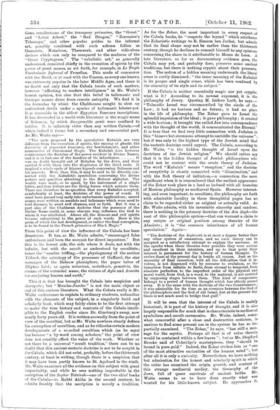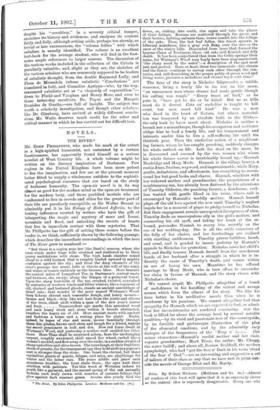THE CABALA.*
is hardly any subject of which the ordinary idea is more vague than the Cabala. When a popular novelist writes ' about "cabalistic signs" he has dim notions perhaps of Abracadabra and unholy incantations ; more often he means nothing more than "secret." Indeed, even to a well-read man it is doubtful whether the Cabala—although learnedly spelt Sabalah or Kabbalah—conveys any other than magical associa- • The Doctrine and Literature of the Kabalah. By Arthur Edward Waite. London : The Theosophical Publishing Society. [7s. 6d. net. J tions, recollections of the trumpery grimoires, the " Great " and "Little Albert," the "Red Dragon," " Zoroaster's
Telescope," and other popular guides to the infernal art, possibly combined with such solemn follies as . Gematria, Notaricon, Themurah, and other ridiculous devices which can only be compared to the madness of the "Great Cryptogram." The "cabalistic art," as generally
understood, consisted chiefly in the evocation of spirits by the power of great names, as set forth, for example, in Le Triple Vocabulaire Infernal of Prinellan. This mode of commerce with the Devil, or at *Least with the Unseen, as every one knows, was extremely popular in the later Middle Ages, and there is
no doubt not only that the Cabala treats of such matters, however "afflicting to modern intelligence" in Mr. Waite's honest opinion, but also that this belief in talismanic and theurgic names dates from remote antiquity. We find it in
• the formulas by which the Chaldaeans sought to shut up malevolent devils under a species of talismanic lobster-pot.
It is traceable in the oldest Egyptian funerary inscriptions. It has descended in a world-wide literature in the magic name of Solomon, by which disagreeable genii were confined to bottles. It is infinitely older than any written Cabala,—of which indeed it forms but a secondary and unessential part.
As Mr. Waite says— "The ends proposed by the speculative Kabalah are very different from the evocation of spirits, the raising of ghosts. the discovery of concealed treasures, the bewitchments, and ether mummeries of Ceremonial Magic. The Kabalah does however countenance the doctrine of the power resident in Divine Names, and it is in fact one of the burdens of its inheritance It was no doubt brought out of Babylon by the Jews, and they carried it with them into the dispersion of the third exile. It inspired a whole cycle of bizarre legends concerning Solomon and his marvels. More than this, it may be said to be directly con- nected with the Kabalistic symbolism concerning the divine powers and qualities attaching to the Hebrew alphabet. The worlds were made, so to speak, by the instrument of -a single letter, and four letters are the living forces which actuate them. There can therefore be no question that every Kabalist accepted, symbolically at least, the doctrine of the power of words. It must have passed very early into unfortunate applications; sacred names were written on amulets and talismans which were used to heal diseases, to avert evil chances, and so forth. But it was a part also of the Chaldaean doctrine that the possessor of the Divine Name could, in some obscure way, influence the God to whom it was attributed. Above all, the demons and evil spirits became subservient to the power of such words. Here is the germ of which the last development, or rather the final corruption, is to be found in the French grimoire,s of Black Magic."
From this point of view the influence of the Cabala has been disastrous. It has, as Mr. Waite admits, "encouraged false.
enthusiasm and been the warrant for direct imposture." But this is its lowest side, the side where it deals, not with the infinite, but with the occult as understood by occultists ; hence the "sombre trifling,—the physiognomy of the section
Yithroh, the astrology of the processes of Gaffarel, the star messages of the Hebrew planisphere, the paper tubes of Eliphas Levi ; or amain notaricon, metathesis, gematria, the arcane, of the extended name, the virtues of Agla and Ararita for conjuring heaven and earth."
This it is that has brought the Cabala into suspicion and disrepute; but " Mumbo-Jumbo " is not the main object or end of this curious literature. What the Cabala really is Mr.
Waite endeavours to explain to ordinary students, unfamiliar with the elements of the subject, in a singularly lucid and scholarly book, which may fairly claim to be the first attempt to make the true history and contents of the Cabala intelli- gible to the English reader since Dr. Ginsburg's essay, now nearly forty years old. It is written avowedly from the point of view of the occultist, but as Mr. Waite nowhere clearly defines his conception of occultism, and as he ridicules certain modern developments of a so-called occultism which (as he says) has become "a by-word among scholars," the point of view does not sensibly affect the value of the work. Whether or not there be a universal "occult tradition," there can be no doubt that this ancient esoteric doctrine is not to be sought in the Cabala, which did not exist, probably, before the thirteenth century, at least in writing, though there is a suspicion that it may have been partly known to St. Agobard in the ninth.
Mr. Waite examines all the evidence on this subject with great impartiality, and while he sees nothing improbable in the ascription of the Sepher Yetssirah—one of the two chief books
of the Cabala—to Rabbi Akiba in the second century, he admits frankly • that the ascription is merely a tradition.
As for the Zohar, the most important in every respect ol the Cabala books, he "respects the legend" which attribute* the Zoharistic writings to R. Simeon ben Jochai, but admit€
that its final shape may not be earlier than the thirteenth century, though he declines to commit himself to any opinions concerning the share in it attributable to Moses de Leon. A late literature, so far as documentary evidence goes, the Cabala may yet, and probably does, preserve some ancient traditions, but there is nothing cryptic about their presently tion. The notion of a hidden meaning underneath the literal sense is curtly dismissed : "the inner meaning of the Kabala]] is its proper and single sense, which has been confused by the obscurity of its style and its subject."
If the Cabala is neither essentially magic nor yet cryptic what is it? According to its newest exponent, it is the philosophy of Jewry. Quoting M. Isidore Loeb, he says Talmudic Israel was circumscribed by the circle of the
Law ; it had no horizon and no future ; it had no place in the life of philosophy. The Zohar gave to Israel the splendid impulsion of the ideal ; it gave philosophy; it created
a wide horizon; it brought the exiled Jew into correspondence with the thought of the world; it communicated the Eternal.' It is true that we find very little connection with Judaism in this "bizarre but strenuous attempt to unriddle the universe"; but it was only to the highest type of the Jewish mind that the esoteric doctrine could appeal. The Cabala, according to Mr. Waite, "is the hidden thought of Israel upon the doctrines of the Jewish religion." We should rather say that it is the hidden thought of Jewish philosophers who could not be content with the crude theory of Judaism. The word "Kabalah" means "reception." and the doctrine of receptivity is closely connected with "illumination," and with the Sufi theory of initiation,—a connection the more significant when it is remembered that the earliest appearance of the Zohar took place in a land so imbued with all branches of Moslem philosophy as mediaeval Spain. However interest- ing, and even important, to occultists, the philosophy set forth with admirable lucidity in these thoughtful pages has no claim to be regarded either as original or actually valid. As Mr. Waite admits, with his invariable sincerity and candour,
there is nothing in the primary doctrine of the Ain Sopli—the root of this philosophic system—that can warrant a claim to
any unique or original position among theories of the Absolute ; it is "the common inheritance of all human
speculation." Again— "The doctrine of the Sephiroth is at most a degree better than any other system of emanation, and no such theory can be accepted as a satisfactory attempt to explain the universe. At the epochs -when these theories were possible they were serious and excellent in their intention, and up to that point their interest is permanent for the history of human thought. To revive them at the present day is beside all reason. Just as the necessity of final causation, with all the difficulties that it in- volves, is not dispensed with by recourse to evolution, so the transition from infinite to finite, from eternal to temporal, from absolute perfection to the imperfect order of the physical and moral world, from God, in a word, to the material, is not assisted by supposing stages between them. This kind of compromise belongs to a period of human thought which has utterly passed away. It is the same with the doctrine of the two Countenances; it was admirable for its time as an eirenicon between the God of the philosophers and the God of old Israel, but at the present day there is not much need to bridge that gulf."
It will be seen that the interest of the Cabala is mainly historical; it is part of the history of thought, and it is also largely responsible for much that is characteristic in mediaeval
symbolism and occult ceremonies. Mr. Waite, indeed, some- what remorseful after a close and destructive criticism, is anxious to find some present use in the system he has so im- partially examined. "The Zohar," he says, "has still a mes- sage for the mystic. Perhaps all that is of value therein would be contained within a few leaves " ; but as Mr. Stopford Brooke said of Coleridge's masterpieces, they "should be bound in pure gold." Indeed, the Zohar strikes him as "one of the most attractive curiosities of the human mind"; but after all it is only a curiosity. Nevertheless, we have nothing but admiration for the honest and scholarly spirit in which the critic has examined the origin, growth, and content of this strange mediaeval medley, the theosophy of the Jews, full of queer survivals of ancient faiths. Mr- Waite seems to us to have done exactly what was wanted for his little-known subject. He approaches it, despite his "occultism," in a severely critical temper, examines its history and evidences, and analyses its content fairly and fully, although setting aside, perhaps too sternly, as trivial or late excrescences, the "solemn follies" with which cabalism is usually identified. The volume is an excellent text-book for the average student, who will find in the foot- notes ample references to larger sources. The discussion of the various works included in the collection of the Cabala is peculiarly valuable; and, slight as they are, the sketches of the various scholars who are commonly supposed to be leaders of cabalistic thought, from the double Raymond Lully, and Ficus de Mirandola (whose cabalistic " Conclusions " are translated in full), and Cornelius Agrippa—who, by the way, renounced cabalistic art as "a rhapsody of superstition "- down to Fludd and Vaughan and Henry More, and even to those latter-day occultists, Dr. Papus and the Marquis Stanislas de Guaita,—are full of insight. The subject was worth a scholarly investigation, and though other scholars, like Dr. Ginsburg, have arrived at widely different conclu- sions, Mr. Waite deserves much credit for the sober and critical manner in which he has carried out his difficult task.












































 Previous page
Previous page